Ovid was born in Sulmona, in the province of L’Aquila, but was destined to die far from home. Joe Gartman tells his story…
Photos by Patricia Gartman unless otherwise stated
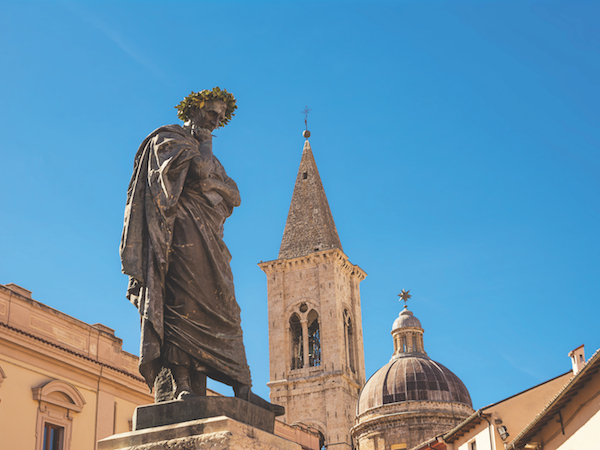
In December of the year 8 AD, a Roman citizen named Publius Ovidius Naso left Rome on a long journey. After enduring ferocious storms in the Adriatic and rough sailing in the Ionian Sea and the Gulf of Corinth, he crossed the Aegean to Samothrace. Then, after transiting the Dardanelles and the Bosporus, he landed on the eastern coast of Thrace, somewhere in today’s Bulgaria. From there he travelled by foot to a small Roman outpost on the Black Sea called Tomis, arriving in September of 9 AD. It was a journey worthy of Odysseus, except that he wasn’t going home. He had been exiled to Tomis by Augustus Caesar.
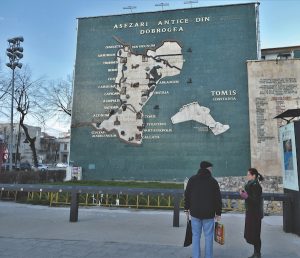
The reasons for his exile are unknown, though there have been plenty of scholarly guesses. One vital fact is that he was a celebrity in Rome, under his nom de plume, Ovid. Ovid, of course, was the author of the Metamorphoses, the timeless masterpiece in which more than 250 of the most central myths of Western culture are told by a poet of genius. Apollo and Daphne, Perseus and Andromeda, the abduction of Proserpina, the Minotaur of Knossos, Daedalus and Icarus, and hundreds more live in our collective consciousness because of Ovid.
But he was famous in his own time for two other, earlier, works: Ars Amatoria and Remedia Amoris: clever, rather cynical, and definitely erotic works published around 1 or 2 AD. In them, he advised men how to seduce women, women how to seduce men, and both sexes how to successfully fall out of love when convenient. These rather racy works probably displeased Augustus, who had launched a campaign promoting morality and marital fidelity. But Augustus did not banish Ovid until several years later.
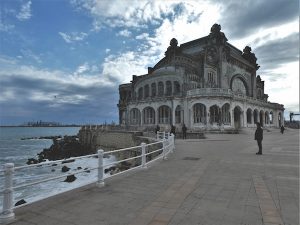
In exile, Ovid wrote several works, including a lament about his situation called Tristia. He never divulges the reasons for his punishment in Tristia, but hints about them: “Two crimes, a poem and a mistake, (carmen et error) have brought me ruin; of my fault in one of them, I must be silent.” The poem, of course, must surely be Ars Amatoria; but the nature of the “mistake” has been a mystery for centuries. But it’s intriguing to remember two other people exiled by Augustus: his daughter Julia the Elder, and his granddaughter, Julia the Younger.
The elder Julia had three sons and two daughters, including the younger Julia, by her husband, Marcus Agrippa, Augustus’s close friend. The two oldest boys, potential successors to Augustus, died young in foreign service. The youngest boy, Agrippa Postumus, born after his father’s death, was passed over by Augustus in favour of his adoptive son Tiberius. Julia the Elder was required by her father to marry Tiberius, much to the horror of both bride and groom. In the year 2 BC, she was exiled by her father to the tiny island of Pandateria, in the Tyrrhenian Sea, charged with adultery.
Augustus’s granddaughter, Julia the Younger, suffered a rather similar fate a decade later. Married to Lucius Aemilius Paullus, she was exiled for immorality and adultery in 8 AD, the same year in which Ovid was sent to Tomis. Her lover, Decimus Junius Silanus, went into voluntary exile; some years later, her husband, Paullus, was executed for plotting against Augustus.
Ovid was one of the younger Julia’s friends, a member of her rather sophisticated and unconventional circle. Was he banished for participating in Paullus’ conspiracy? It seems unlikely, because Ovid, while keeping his “error” secret, wrote “I am not accused of following rebellious arms”. Perhaps Julia plotted to promote her brother Agrippa Postumus’s claims to succession over Augustus’s choice, Tiberius. Could Ovid have known of or assisted in that plot?
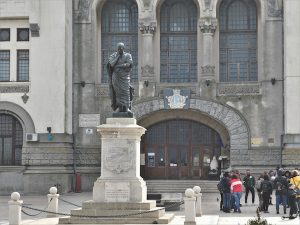
A third possible explanation, and one that I find simple enough to be true, is that Ovid, with his worldly outlook, knew of and perhaps helped Julia and her lover conduct their adulterous affair, and Augustus finally found out about it. This would connect the two “crimes” Ovid mentions – the poem and the mistake – in Augustus’ mind: the immoral poet turns his salacious advice to lovers into practice, with Augustus’s own granddaughter as a participant!
Constanta, in Romania, is a major port city and, in the warm summertime, a popular resort destination. It rests upon the site of Tomis; but in Ovid’s poems from exile he speaks of Tomis as the edge of the world, a lonely outpost on a barren, grey plain swept with violent winds and populated by near savages. Possibly he was exaggerating, to gain Augustus’s pity and a reprieve which never came. He died in 17 AD.
The plain is there, still rather barren. Little remains of ancient Tomis – it is buried deep under today’s city. There are many Roman-era ruins in Constanta, but from a later time.
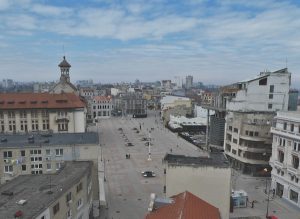
The wind is still there in winter, a freezing northeast gale called the Crivat. The wind whistles around a beautiful, abandoned and crumbling 19th-century Cazino on the seafront promenade, the pride of Constanta when it called itself the “Monte Carlo of the Black Sea”. The wind howls through the davits and cranes of the port, and in the old city, drowns out the muezzin’s voice from the great mosque’s spire and the bells from the Orthodox cathedral’s tower. And it blows the pigeons away from the tall statue of the city’s favourite adopted son, in the centre of the huge square named for him, Piata Ovidiu – Ovid Square.
On December 14, 2017, far away in Rome, the City Council formally revoked Ovid’s banishment, to mark the 2000th anniversary of the poet’s death.
